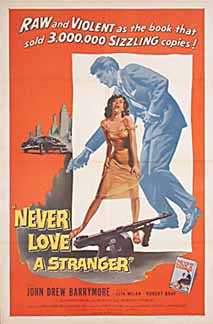
NEVER LOVE A STRANGER
US, 1958, 95 minutes, Black and white.
John Drew Barrymore, Lita Milan, Steve Mc Queen.
Directed by Robert Stevens.
A surprisingly interesting and entertaining gangster story. Small budget, though based on an early Harold Robbins novel, the film captures something of the atmosphere of the world of the American gangster and the human emotions and repercussions of people living In this world. John Drew Barrymore is effective in the central role, and the film is interesting because of one of the early appearances of Steve Mc Queen. Not a great film, but one which probably reflects quite a lot of the Hollywood tradition of film-making and a focus on the gangster tradition.
1. How interesting a crime drama, how enjoyable? The American values considered and explored?
2. The film-making of the late fifties, the American gangster tradition of the thirties and forties? The comparison with this film? Black and white photography, sets, the moralizing narrative, the moral presented at beginning and end, the issues of American society, right and wrong, gangsterism, Catholics and Jews?
3. How interesting was the commentary on the behaviour of Frankie? The pointing of the moral? Was this too explicit? The emphasis on birth and death and the meaning of life?
4. The emphasis of the opening, the 1912 atmosphere, the poverty of the city, Frankie's mother and her death, the birth of the child, the Catholic atmosphere later to be revealed as Jewish?
5. The film's comment on circumstances of life influencing people, Frankie and the orphanage, his growing up, criminal background, money and honesty, his initial honesty and work, the fascination of easy money and of big-name people with reputations? What influence did they have on his later life?
6. The contrast with the rich Jewish boy, lonely, being punched by the Catholics, his defence by Frankie? Being punched yet defended? The invitation to teach him how to boa? The growing friendship? The girl? A happy basis for friendship and lack of prejudice?
7. The irony of Frankie’s being Jewish? The role of the orphanage and the priest? His loving the girl yet his decision to run and not face reality? His life during the Depression, hard work, resentment, lack of communication with his friends? The effect on him and his aging?
8. How well did the film draw the parallel courses of the two men? Frankie's growing criminal involvement, the return to the people he admired in the past, his renewal of friendship with the girl, her singing, his doing petty jobs, clashing with the law? The Jewish boy to growing up to be working with the District Attorney? The man of law, respectability? Now did the two men change and develop?
9. The background of the underworld, Frankie's involvement, his hurting others, his empire, his defiance, the presentation of headlines etc.?
10. How inevitable was it that the two men would cross paths? Their comparative success? The inevitability of confrontation?
11. The presentation of deals, discussion? The criminal jealousy against Frankie and the tricks even against his life? The issues of lives being saved, the appeal of the girl? Issues of love and friendship?
12. The pathos of Frankie's death, its irony, the significance of the flashback framework of the film, the meaning of Frankie’s life?
13. How convincing a story of a gangster? Part of the American heritage and tradition? The exploration of values?